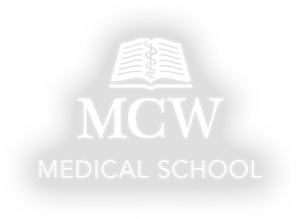MCW-Central Wisconsin Curriculum
MCW-Central Wisconsin Academic Program
Curriculum Schedule
MCW's three-year curriculum is a calendar-efficient program available at MCW-Central Wisconsin, allowing for graduation one year earlier than traditional programs. This is achieved by reducing the number of electives and the length of the traditional medical school breaks, and is appealing if you prefer to graduate sooner and begin working as a physician sooner.
One of the hallmarks of an MCW education is participating in a Scholarly Pathway, allowing you to individualize your medical education. As an MCW-Central Wisconsin student, the Physician in the Community Pathway will link your medical education with the resources and needs of the Central Wisconsin area communities and our partners to promote health in the region.
This unique MCW educational experience is designed to cultivate your medical skills and interests and transform them into a quest for lifelong learning in your practice as a primary care physician, general surgeon, psychiatrist or other specialty shortage fields.
The Physician in the Community Scholarly Concentration
Your MCW-Central Wisconsin medical education experience will include participation in our Physician in the Community Scholarly Concentration, linking your medical education with the resources of our clinical partners and the needs of the local community to promote health.
Clinical Experiences
MCW-Central Wisconsin partners with many healthcare leaders and organizations in the region to provide clinical experiences for our medical students. Students at MCW-Central Wisconsin will need a vehicle to travel to their assigned clinical sites, beginning with one half-day per week in the fall of Phase 1. For the longitudinal integrated clerkship experience during Phase 2, and possibly electives and other clinical rotations during Phase 3, students often relocate to their assigned clerkship site. MCW-Central Wisconsin works closely with our healthcare partners to help connect students with all available resources during their clerkship experiences.
Interprofessional Education (IPE)
You will learn about and participate in various IPE sessions throughout the Curriculum. You will be introduced to IPE early on and have an opportunity to work in student interdisciplinary teams with various health program students from partnering institutions. Your IPE experiences will provide you with the tools to identify your own professional role, identify the roles of other professionals, and learn how to effectively collaborate with other health professionals in order to establish mutual respect, dignity, diversity, ethical integrity and trust.


